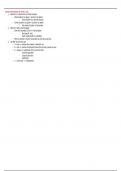Summary
Summary Exercises European taxation
- Course
- Institution
Clear, structured and complete schedule for solving solutions. Includes cases to mention, clue of the cases and accompanying paragraphs. Essential to pass the exam. Clear, structured and complete diagram to solve solutions. Includes cases to be listed, clue of the cases and accompanying paragrap...
[Show more]



